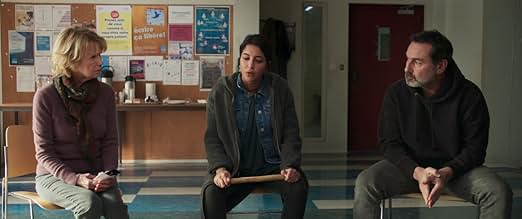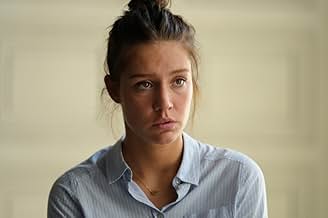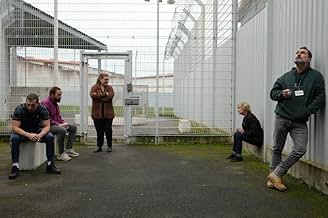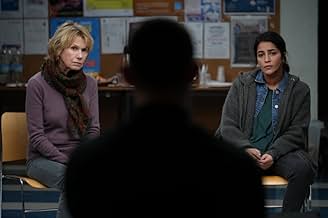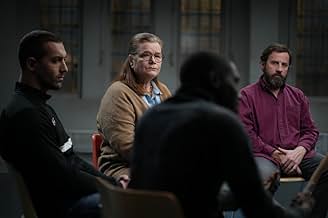Je verrai toujours vos visages
- 2023
- Tous publics
- 1h 58m
IMDb RATING
7.5/10
4.4K
YOUR RATING
Victims of violent crime and perpetrators meet up in a restorative justice group in order to have a dialogue and heal from their trauma.Victims of violent crime and perpetrators meet up in a restorative justice group in order to have a dialogue and heal from their trauma.Victims of violent crime and perpetrators meet up in a restorative justice group in order to have a dialogue and heal from their trauma.
- Awards
- 1 win & 9 nominations total
Suliane Brahim
- Fanny
- (as Suliane Brahim de la Comédie Française)
Denis Podalydès
- Paul
- (as Denis Podalydès de la Comédie Française)
Featured reviews
It seems exactly like the type of films that I cannot remain indifferent to. So realistic and such a compelling story. It is exactly what I have expected from this movie to be. An internal and uncontrolled storm that doesn't let its viewers to stay calm.
The thoughts are running to so many directions and the work of the director: Jeanne Herry, which has made the great "Pupille" is just so accurate, that you sometimes feel that you are in the same room with the same people that are opening themselves to strangers, that are at a different spot.
The film is talking about a special program that is bringing crime victims and criminals that made the same crime (or even the crime itself) together. It is a healing process that requires both sides to be open minded and try to tolerant to towards the other side.
The movie is talking about traumas that not sure anyone, that hasn't suffered those types of "Minor" traumatizing experiences will understand. It is taking people from a wide range and dives into each one of them and into its traumatic experience and lesson learning, that takes place while they speak.
It is an experience like no other, for the movie industry and a great achievement in directing and acting. Takes each and every one of the viewers from his safe spot and confronts with reality and still has a lot of hope and redemption in it. Very special film and experience that not every viewer can withstand, but for movies lovers, it is a must.
The thoughts are running to so many directions and the work of the director: Jeanne Herry, which has made the great "Pupille" is just so accurate, that you sometimes feel that you are in the same room with the same people that are opening themselves to strangers, that are at a different spot.
The film is talking about a special program that is bringing crime victims and criminals that made the same crime (or even the crime itself) together. It is a healing process that requires both sides to be open minded and try to tolerant to towards the other side.
The movie is talking about traumas that not sure anyone, that hasn't suffered those types of "Minor" traumatizing experiences will understand. It is taking people from a wide range and dives into each one of them and into its traumatic experience and lesson learning, that takes place while they speak.
It is an experience like no other, for the movie industry and a great achievement in directing and acting. Takes each and every one of the viewers from his safe spot and confronts with reality and still has a lot of hope and redemption in it. Very special film and experience that not every viewer can withstand, but for movies lovers, it is a must.
Je verrai toujours vos visages is part of a recent wave of French cinema that sheds light on the public institutions' efforts to heal woes in society and help the vulnerable. Basically, the "Fraternité" in the French Republic motto "Liberté - Egalité - Fraternité."
So, if you have enjoyed watching Hors Normes, or Pupille, this movie should be a positive experience for you.
You may have read the plot. You may be concerned that the movie is too emotionally heavy. That life is already painful and you are not in the mood for a movie tackling an issue so serious. Rest assured: the movie is not all suffering. Go for it. You will learn something or two, including the value of compassion.
One element of disappointment for me is the packaging of the stories together into a movie. The movie switches between two different stories, and I was personally not convinced that there is any real synergy between them. It feels like each story was not enough for one movie, so they glued the two together. Or that the creators were keen on showing different missions undertaken by the Restorative Justice system. Likewise, the movie delves randomly and somewhat superficially at the personal lives of the public agents. We get sneak peaks every now and then that we could have done without. Too much and at the same time not enough.
In short, good story but the salt and pepper of the movie could have been better seasoned.
So, if you have enjoyed watching Hors Normes, or Pupille, this movie should be a positive experience for you.
You may have read the plot. You may be concerned that the movie is too emotionally heavy. That life is already painful and you are not in the mood for a movie tackling an issue so serious. Rest assured: the movie is not all suffering. Go for it. You will learn something or two, including the value of compassion.
One element of disappointment for me is the packaging of the stories together into a movie. The movie switches between two different stories, and I was personally not convinced that there is any real synergy between them. It feels like each story was not enough for one movie, so they glued the two together. Or that the creators were keen on showing different missions undertaken by the Restorative Justice system. Likewise, the movie delves randomly and somewhat superficially at the personal lives of the public agents. We get sneak peaks every now and then that we could have done without. Too much and at the same time not enough.
In short, good story but the salt and pepper of the movie could have been better seasoned.
A major problem with the criminal justice systems in assorted countries - including the United States - is that they emphasize punishment over rehabilitation; one might say that these are criminal injustice systems. I don't know how it works in France, but Jeanne Herry's "Je verrai toujours vos visages" ("All Your Faces" in English) offers a possibility: restorative justice. This regimen features discussions between inmates and their victims.
It's not always a smooth process, as there's plenty of tension between people (especially due to the variety of races). Nonetheless, there's the chance of forgiveness and increased understanding of the causes of anything defined as crime. I wouldn't call it a masterpiece, but it's worth seeing. I don't know if it's available on any streaming service, so you might have to check a neighborhood video store.
The cast includes Miou-Miou and Adèle Exarchopoulos (who more recently voiced Ennui in "Inside Out 2").
It's not always a smooth process, as there's plenty of tension between people (especially due to the variety of races). Nonetheless, there's the chance of forgiveness and increased understanding of the causes of anything defined as crime. I wouldn't call it a masterpiece, but it's worth seeing. I don't know if it's available on any streaming service, so you might have to check a neighborhood video store.
The cast includes Miou-Miou and Adèle Exarchopoulos (who more recently voiced Ennui in "Inside Out 2").
The topic is not the same, but the overall atmosphere and more or less scheme, kind of drama, reminded me TWELVE ANGRY MEN, a story which takes mostly place in one room - whithout being a trial - involving people, men and woman, victims and perpetrators, facing each other, and trying to talk, explaining, showing, confessing what they felt....it has never been done before and that makes it even more powerful, astounding. It is purely stunning. Terrific dialogues. However, I can understand that some audiences may be annoyed , because it is naive, unrealistic. That's a matter of taste, point of view, that depends of which angle you watch it. Something is wrong in the story lines, when a young hoodlums speaks of a home jacking where he and his pals took credit cards with the secret code to retrieve money from the cash machines. In France, with a credit card - stolen or not - you can retrieve ONLY 400 euros each week. So when this hoodlum says that one of his pals bought a new motorcycle with his share of the loot, that's not possible.... The hoodlums could only at best retrieve 400 euros. Because a few hours after the homejacking, the victimes have necessarily declared the robbery to their bank. 400 euros shared between three, that's doesn't allow anyone to buy a new motorcycle. No way. And the most unusual is that you have two different stories in this film: the group and Chloée character problems with her half brother. They never meet. Strange but why not.
One film, one theme, two storylines. A confrontation between victims and perpetrators, which should have added value for each side. The one in which people with no direct connection meet seems to bring the desired insights and peace. Naive, but perhaps. Aversion, getting to know each other, understanding. Just a film, idealistic. But at least one that literally shows its colours regarding the perpetrators of the current crime terror over Europe. Of course, the usual explanations and excuses for the escalation of character are used: poverty, education, opportunities. Yawn. Everyone chooses their own exits at the crossroads of morality. But yes, otherwise this film would certainly not have ended up on the big screen, or would have been crucified by the media instead of being showered with awards. In my opinion, the softening of concepts such as perpetrator, victim and guilt are questionable approaches and primarily benefit injustice.
The other side works less well in its catharsis. Understandably, the resurgence of all pain through direct contact with the perpetrator is an emotional one-way street.
I went to see the film because it featured some of the cinematic greats of French cinema, but I can only recommend it to a limited extent. No resonance, no added value. Nevertheless, it is a high-quality production, well acted and at least endeavours to keep its feet on the ground. If I imagine this as a German production, ouch.
The other side works less well in its catharsis. Understandably, the resurgence of all pain through direct contact with the perpetrator is an emotional one-way street.
I went to see the film because it featured some of the cinematic greats of French cinema, but I can only recommend it to a limited extent. No resonance, no added value. Nevertheless, it is a high-quality production, well acted and at least endeavours to keep its feet on the ground. If I imagine this as a German production, ouch.
Did you know
- TriviaTo research the subject, writer/director Jeanne Herry couldn't take part in actual meetings of restorative justice, given that they are supposed to be a safe place, and nothing that is said there is meant to be told elsewhere. So instead, she went through three formations, which she felt were very insightful: the one which Fanny and Michel go through in the movie, the one to be a mediator, like Judith in the movie, and one in Québec via Zoom.
- ConnectionsReferences 12 Hommes en colère (1957)
- How long is All Your Faces?Powered by Alexa
Details
- Release date
- Country of origin
- Official site
- Language
- Also known as
- Las dos caras de la justicia
- Filming locations
- Place des Prêcheurs, Aix-en-Provence, Bouches-du-Rhône, France(Chloé's apartment)
- Production companies
- See more company credits at IMDbPro
Box office
- Gross worldwide
- $9,065,011
- Runtime1 hour 58 minutes
- Color
- Aspect ratio
- 2.39 : 1
Contribute to this page
Suggest an edit or add missing content

Top Gap
By what name was Je verrai toujours vos visages (2023) officially released in Canada in French?
Answer
![Watch Bande-annonce [OV]](https://m.media-amazon.com/images/M/MV5BZWYwMjBhODctNzBkMS00YTNmLWFmMWMtMzExNTc0MmIxYzI2XkEyXkFqcGdeQXRyYW5zY29kZS13b3JrZmxvdw@@._V1_QL75_UX500_CR0)
